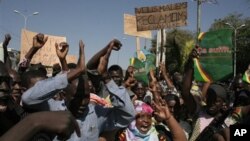UNITED NATIONS —
The U.N. Security Council has expressed concern that the instability in northern Mali is threatening peace and security in the rest of the Sahel.
At a meeting Monday on the Sahel, the 15-nation Security Council said in a statement there is a need to “respond swiftly” to the crisis through a comprehensive and strategic approach that includes restoring Mali’s territorial integrity and preventing further destabilization of other countries in Africa's Sahel region.
U.N. Secretary-General Ban Ki-moon told the meeting that there is “a sustained, systemic crisis” across the entire region.
“The warning lights for the Sahel region continue to flash. Political turmoil, terrorist activity, drug trafficking and arms smuggling are spilling over borders and threatening peace and security. Extreme climatic conditions and fragile economies only add to this toxic brew of vulnerability,” he said.
Ban said the United Nations has mobilized more than $1 billion to help Sahel countries respond to the immediate needs of affected populations - among them the more than 140,000 refugees who have fled instability in Mali after rebels and terrorist groups seized control of the northern part of the country.
Two months ago, the U.N. chief appointed former Italian Prime Minister Romano Prodi as his special envoy for the Sahel, tasked with developing and implementing an integrated strategy for the region. That strategy will encompass governance, security, humanitarian, human rights and developmental issues.
Prodi told the Security Council that the Sahel’s challenges include high youth unemployment, weak institutions, organized crime and terrorism. On Mali, he said the situation could potentially affect the entire region and that any international intervention must ensure that what has happened in Mali does not spread to all of the Sahel. He also reflected the U.N. secretary-general’s cautious stance regarding authorizing an outside military force for Mali.
“Any military force in Mali must be undertaken after careful analysis and through preparation and that this effort could be part of an agreed political process that tackles the root of the conflict,” said Prodi.
The West African regional bloc ECOWAS was represented at Monday’s meeting by Ivory Coast Foreign Minister Charles Koffi Diby. He urged the council to quickly authorize an African-led force of 3,300 troops to help restore stability to Mali. He spoke through a translator, referring to the mission, which is to be known by the acronym AFISMA.
“We must act urgently and now, because any further delay of the adoption of a resolution authorizing the deployment of AFISMA is likely to strengthen the position of the terrorists, and the price to pay for their removal will be even higher for all of us,” said Diby.
France has taken the lead on drafting a resolution authorizing AFISMA’s deployment. The French ambassador has said he hopes it will be adopted before the end of this year.
At a meeting Monday on the Sahel, the 15-nation Security Council said in a statement there is a need to “respond swiftly” to the crisis through a comprehensive and strategic approach that includes restoring Mali’s territorial integrity and preventing further destabilization of other countries in Africa's Sahel region.
U.N. Secretary-General Ban Ki-moon told the meeting that there is “a sustained, systemic crisis” across the entire region.
“The warning lights for the Sahel region continue to flash. Political turmoil, terrorist activity, drug trafficking and arms smuggling are spilling over borders and threatening peace and security. Extreme climatic conditions and fragile economies only add to this toxic brew of vulnerability,” he said.
Ban said the United Nations has mobilized more than $1 billion to help Sahel countries respond to the immediate needs of affected populations - among them the more than 140,000 refugees who have fled instability in Mali after rebels and terrorist groups seized control of the northern part of the country.
Two months ago, the U.N. chief appointed former Italian Prime Minister Romano Prodi as his special envoy for the Sahel, tasked with developing and implementing an integrated strategy for the region. That strategy will encompass governance, security, humanitarian, human rights and developmental issues.
Prodi told the Security Council that the Sahel’s challenges include high youth unemployment, weak institutions, organized crime and terrorism. On Mali, he said the situation could potentially affect the entire region and that any international intervention must ensure that what has happened in Mali does not spread to all of the Sahel. He also reflected the U.N. secretary-general’s cautious stance regarding authorizing an outside military force for Mali.
“Any military force in Mali must be undertaken after careful analysis and through preparation and that this effort could be part of an agreed political process that tackles the root of the conflict,” said Prodi.
The West African regional bloc ECOWAS was represented at Monday’s meeting by Ivory Coast Foreign Minister Charles Koffi Diby. He urged the council to quickly authorize an African-led force of 3,300 troops to help restore stability to Mali. He spoke through a translator, referring to the mission, which is to be known by the acronym AFISMA.
“We must act urgently and now, because any further delay of the adoption of a resolution authorizing the deployment of AFISMA is likely to strengthen the position of the terrorists, and the price to pay for their removal will be even higher for all of us,” said Diby.
France has taken the lead on drafting a resolution authorizing AFISMA’s deployment. The French ambassador has said he hopes it will be adopted before the end of this year.




